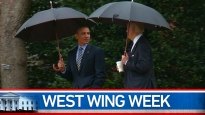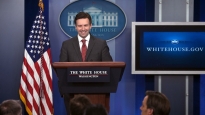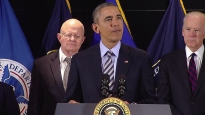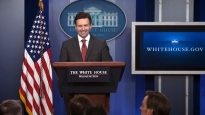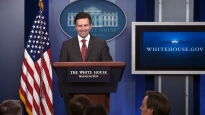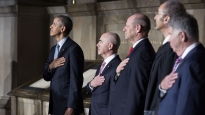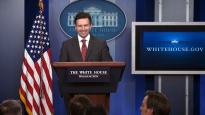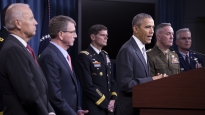White House Press Briefing: March 27, 2009
March 27, 2009 | 39:56
White House Press Briefings are conducted most weekdays from the James S. Brady Press Briefing Room in the West Wing. (public domain)
Briefing by White House Press Secretary Robert Gibbs, 3-27-09
THE WHITE HOUSE
Office of the Press Secretary
_________________________________________________________________For Immediate Release March 27, 2009
PRESS BRIEFING
BY PRESS SECRETARY ROBERT GIBBS
BY PRESS SECRETARY ROBERT GIBBS
James S. Brady Press Briefing Room
2:05 P.M. EDT
Q Thanks for the warning.
MR. GIBBS: Are your ready? Do you want me to go back out?
Q Seriously --
MR. GIBBS: Well, I wanted to go talk to the President and get his thoughts on the bankers meeting. So I apologize for --
Q I know, but it happens every day. I don't want to be like a big showdown, but it irritates everybody here. If you could just be on time or give us better warning.
Q You just gave us a two-minute warning. You guys gave us a two-minute warning -- that's why we all came out.
MR. GIBBS: Okay, well, my apologies. I was in talking to the President. So I apologize for the inconvenience.
Let me start with a couple of announcements and I'll give you a rundown of the President's thoughts on the meeting that he just finished.
As you all know, the Vice President arrived today for a four-day trip to South and Central America, to consult with Latin American leaders gathered in Chile and Costa Rica to discuss the upcoming Summit of the Americas. He's on the trip with Dr. Jill Biden.
In Chile, the Vice President will attend the Progressive Governance Conference with several Latin American and European heads of state, and hold bilateral meetings with leaders. In Costa Rica, the Vice President will hold a bilateral meeting with the President before participating in a multilateral meeting with Central American leaders. He returns to Washington, D.C. late Monday evening.
Secondly, let me give you just a quick rundown on the situation in North Dakota and in Minnesota. The White House is actively monitoring the impacts of the flooding in North Dakota and Minnesota. As you know, the President approved a major disaster declaration for the state of North Dakota on March 24th, and last night the President approved an emergency declaration for the state of Minnesota.
On the ground, the federal government continues to actively coordinate with state and local governments in both states to address the ongoing flood fight. This effort has been underway since late last week. FEMA, the Army Corps of Engineers, the Coast Guard, the National Guard, and other federal agencies, as well as the American Red Cross, have been -- continue the actively work with these officials to ensure their needs are being met.
Federal support is being provided up and down the Red River. Nancy Ward, the Acting FEMA Administrator, is on the ground currently in Fargo, and directly talking with federal, state and local officials to ensure that federal assistance is provided to support the response to the flooding. The President this morning talked with Governor Hoeven, Governor Pawlenty, and Fargo Mayor Dennis Walaker today to discuss his concern for the residents of North Dakota and Minnesota, and to ensure that the states are getting the federal assistance they need to supplement any state and local efforts. Secretary Napolitano has been in contact with state and local officials to express her support, and she also briefed the President this morning on the latest developments.
This is important -- we cannot reinforce enough the importance for residents in both states remain vigilant in monitoring the reports of flood crests and to follow the instructions from their state and local leaders in the event that evacuations in their local areas become necessary.
And again, the President continues to be impressed with ongoing efforts of thousands of volunteers as they continue to work to protect their community.
And then, lastly, let me just give you a quick rundown of the President's thoughts about the meeting that just concluded with the bankers. The President believed they had a good, productive and frank conversation. The President opened up by talking about the importance of dealing with toxic assets and getting banks lending again. There was a discussion about the President's and the administration's plan to deal with housing that many of the bankers discussed positively.
There was next a discussion about regulatory reform, and it's fair to say that they agreed on the need to update the framework of regulation and that being important. Also discussed were issues of compensation and the importance of recognizing what the American public is going through in this economic crisis. The President emphasized that Wall Street needs Main Street, and that Main Street needs Wall Street; that everybody has to pitch in; that we're all in this together.
Overall, the President was very pleased about the meeting; continued to stress the need for open lines off communication, and also to stress that there was no agenda -- he had no agenda beyond working to get a solution -- the right solution for our financial system and to get it stabilized and working again for the American people.
And with that --
Q Thank you, Robert. This morning when the President talked about Afghanistan and Pakistan, the only cost he talked about was the Kerry-Lugar bill, which just deals with Pakistan civilian projects. What can the American people expect this initiative to cost, and are you confident that the Congress will go along with the cost?
MR. GIBBS: Well, I think the budget itself is being readied. I don't have an exact increase in monthly operational costs. I think that everybody understands the importance of getting this effort right; that a regional approach that addresses the safety and security of the two countries and of the United States, and working together to ensure that what happened on September 11th doesn't happen again.
Obviously, it's all -- it's going to cost money, and we're asking for a renewed commitment from the American people, and certainly both the men and women in uniform that will serve, as well as an increased number of civilians that will go over to demonstrate all elements of our national power. But as the President said, it is a goal that -- to disrupt, dismantle and defeat al Qaeda. And that's something that we can't afford not to do.
Q Any idea how soon you might have some estimates of the --
MR. GIBBS: I don't. I can certainly check.
Q On the bankers meeting, how strongly did the President press the bankers to sell their toxic assets through the Geithner program? As you know, a lot of them are reluctant to sell them at these prices, hoping that when the economy recovers they can get a better price, and that won't solve the problem.
MR. GIBBS: Well, I think there was a broad discussion about the program. Obviously, as I talked about a couple times this week, and many people have talked about the need for the financial system to be stabilized by getting a lot of these toxic assets off the balance sheets of bankers, and that because of that, there's an incentive through the market to get a price that's established that works for both investors and for those that want to rid their balance sheets of these assets.
So I think the policy is structured so that there is that incentive, and obviously the President believes that -- and I think the bankers said after the meeting -- that what they've heard is a positive first step.
Q But the incentives for the taxpayers are different than the incentives for the bankers. They want the highest possible price --
MR. GIBBS: Well, again, I think -- you know, obviously there's -- and one of the reasons that many, many months ago under Secretary Paulson, the theory was that you might not be able to get this worked because you had -- you lacked an incentive to change something that somebody might value at 95 cents on a dollar and someone might value at 25 cents on a dollar.
Obviously we believe that because of the way the plan is structured, there is an incentive that protects the taxpayers but also gives incentives for banks to want to move those assets off their balance sheets by not totally giving up on them.
Q And what did they say about his message on compensation? Were they receptive to that?
MR. GIBBS: Well, yes, I -- look, I think, and, again, I think as you heard the bankers say, they understand that. I think --
Q They said you didn't talk about it.
Q They said it didn't come up.
MR. GIBBS: I did not hear that. It was discussed.
Q -- said it didn't come up.
MR. GIBBS: It was discussed.
Q Were you in there?
MR. GIBBS: No, Jen was, but I also talked to the President about it.
Yes, Jake.
Q I actually want to follow up on both their points. On Afghanistan, you said that the mission is to disrupt, destroy, et cetera. Other than the new troops, the new commitment of troops, 21,000 more troops, how -- what are the specific ways that this policy is different from the Bush administration policy?
MR. GIBBS: Sure. Well, I think -- I'll pick on several different points, and I'll take you back a little bit and give a little bit broader -- as you well know, the President originally believed that the decision to go into Iraq took the focus and resources away from our effort in Afghanistan; and that today's decision and announcement refocuses on that region of the world where what the President believes is our primary security threat.
It does so with a more tightly focused goal that the President enumerated, with a substantial effort at ensuring that the resources that are needed to achieve those goals are brought to the region, not just in, as you mentioned, the expansion of both combat groups and trainers, but also, as you heard officials talk about, an increase in civilians, in development; that -- I think another thing that builds on the civilian part of this is using all elements of our national power through both -- through those civilian agencies and through diplomacy; that we're looking at this, again, as the President talked about, not as an Afghanistan issue but as an Afghanistan and Pakistan issue.
And obviously the President will do more of this in the coming days as we go overseas, drawing on an international effort to ensure that we continue to put an emphasis in resources in this region of the world.
Q And to follow up on Karen's question, some of the bank -- bank CEOS came out and said that they liked the first -- their first impressions of Geithner's plan to get the toxic assets off the books, but they're waiting for more details. What more details could they possibly be waiting for?
MR. GIBBS: I think that's a better question for them. I don't know the answer to that.
Q Are there more -- I guess the better question for you is, are there more details that you guys are set to introduce?
MR. GIBBS: I think maybe what they're talking about is just the logistics of asset auctions and things like that. But I can certainly check with Treasury -- I mean, obviously, there will be an effort from -- between now and when that happens that we'll roll out plans and details on that. But I'll check specifically with Treasury on that one.
Helen.
Q What proof does the President have to become so hawkish now and to raise the ante on the troop level going in? We were misled so much on Iraq. Why shouldn't we be misled again?
MR. GIBBS: Well, regrettably I think in 2001 we learned the danger of giving extremists that hope and wish us harm the space in a safe haven to plan, practice, coordinate and ultimately execute deadly attacks on this country.
Q Can you prove it? I mean, why don't the American people get more evidence?
MR. GIBBS: Well, I -- one, I think the American --
Q You're going back to 2001.
MR. GIBBS: Well, no, I'm using 2001 as certainly one example, obviously a fairly poignant one. But I think it is -- without getting into details that I can't get into, when the President talks about continuing to get assessments on just how dangerous this part of the world is, I think they can be assured that this region of the world presents many dangers for this country. I think this region of the world poses dangers for Afghanistan. And, look, regrettably, just today, we can see that the extremists in this area pose a danger to Pakistan.
The leader of Pakistan is in power because the leader before was assassinated. I forget the exact number of people that were killed today in a bomb blast. I think there's very credible evidence that the threat exists and that the President will do all in his power to protect the American people.
Q Are they wrong to not want us there?
MR. GIBBS: Is who wrong?
Q The Afghans.
MR. GIBBS: Again, we're there to ensure that al Qaeda and its affiliates don't create a safe haven and don't topple the Afghan government and ultimately use that space to plan and execute those attacks. The President obviously has spoken with leaders of both Afghanistan and Pakistan, and they understand why we're there.
Dan.
Q The President really had the focus, in terms of the threat, on Pakistan. And we see the buildup, the troop buildup, for Afghanistan. But what is the U.S. planning to do to go after this threat? If the terrorists are hiding out and currently planning to strike us, what is being done to cut that off?
MR. GIBBS: In Pakistan?
Q In Pakistan.
MR. GIBBS: Well, I'm not going to get into operational details --
Q Is there something being done?
MR. GIBBS: Is there something being done --
Q To go after the threat in Pakistan? Because there's $5 billion a year in humanitarian, but nothing -- we haven't heard anything at all about some active engagement to go after that threat if we know the threat is there.
MR. GIBBS: I think it would be wise for us not to lay out in front of the world the plan -- that plan of attack.
Q Well, I'm not looking for the plans. Is there something that is ongoing to go after that threat? Because he stated the threat is there; they're planning to attack us.
MR. GIBBS: I think you can be very assured that we're taking the steps necessary to address the threat and to protect the American people.
Q In terms of the timeline, no timeline to extract troops out of Afghanistan. The President I believe in the past has talked about wanting to have a timeline. Why no timeline? Why not sort of set some sort of mark and say, we need to be out by this time?
MR. GIBBS: Well, I think the President did state quite clearly that the policy would be reviewed and evaluated as we go. Obviously if you add in the increase in the number of troops that were added in -- before the President took office, in addition to the 17,000 that the President ordered previously, and the 4,000 trainers today, you're looking at an expansion of roughly 30,000 American troops.
So we have important elections coming up in Afghanistan in a deteriorating security situation, and I think -- first of all, I think the President wants to evaluate what -- and the security team want to evaluate what that increase means for the situation in the region. Obviously the announcement today is to build the capacity of the Afghan army to ensure that ultimately that responsibility of rooting out extremism and protecting the democratically elected government can be done by the Afghans. And also the President will look to evaluate the policy as we move forward as we increase our diplomacy, as we increase the number of civilians that are there to do what the President talked about in terms of the delivery of services without corruption, and for developmental aid.
And so I think that the President will have said and set forward -- and I think you guys heard last night about a flexible strategy that allows the team to evaluate whether the goals are being met and whether the benchmarks are being met, so that we can determine the progress toward making that region of the world safe and stable.
Chuck.
Q Quick bank clarification: Did the issue of timing of returning the TARP money come up at the meeting --
MR. GIBBS: I believe it did. The President and I did not specifically talk about that.
Q So you don't know whether -- what was said, you just know the subject was talked about?
MR. GIBBS: I know the subject came up. I can check with him and see what --
Q Okay. Two unrelated questions here -- everything that's been going on here today. The FAA apparently is not going to -- apparently the FAA is being pressured not to release publicly incidents that have to do -- where incidents occur, whether these bird -- where birds hit planes and what caused the crash on the Hudson, because airlines don't want to give the information -- I mean, isn't this a public safety issue? Shouldn't the government sort of demand that this information be public?
MR. GIBBS: I saw a blurb on it, I read part of it. I would direct you to the FAA on that. I don't have anything on that.
Q Don't have anything?
MR. GIBBS: I don't have anything on that.
Q And it's also our understanding that the President met with some 9/11 families yesterday, this week.
MR. GIBBS: I don't -- I will check on that.
Q Some 9/11 families have asked him about -- had asked the President to get involved with the rebuilding at Ground Zero and some of the delays?
MR. GIBBS: I will check on that. That is not on my stuff, either, but I will have somebody work on that.
Q Following up on Dan's question about the timetable, Robert, would it be accurate to call the military presence there open-ended?
MR. GIBBS: Again, I think the President has set forth a new regional strategy for Afghanistan and Pakistan that he looks to monitor closely and assure -- to assure that we are making progress and to use benchmarks to measure that progress.
I think any conflict -- I don't think any conflict is open-ended. I don't think the President would see it that way. I think the President believes we're setting forth the best strategy that we need to achieve more tightly focused goals of disrupting and destroying al Qaeda; of doing it through the -- with the resources that are needed to get that done in a regional way, using all elements of our national power.
Q Throughout the discussions, have you heard anyone mention any date of when this -- when the troops might come home?
MR. GIBBS: Well, no, I've -- I think they're focused on initially -- obviously there -- as I said, there have been decisions by the previous President and by this President to greatly increase the troop presence. That presence will be evaluated. We have -- we will begin moving an increased amount of civilian personnel in there to more greatly focus, as I said, on the delivery of basic governmental services, on developmental aid that the President talked about in both countries, as well as trainers to ensure that we are making the sustained progress that has to be made and needs to be made to give the responsibility for security back to the Afghans.
Q Has the notion of or concern about mission creep come up?
MR. GIBBS: Well, I think that's always discussed. I mean, I think that -- I think in any decision that is made, you want to ensure that, and I think the President did through enumerating that tightly focused goal -- and that that can be evaluated through benchmarks to measure that progress, to evaluate the policy, and to make the necessary changes. So I think there's -- there's a refocusing. There are -- it's goal-oriented; it's resourced; it's regional. It uses all elements of our power and it will be evaluated each step of the way.
Jonathan.
Q A number of those bank CEOs have spoken out publically against the bonus tax legislation both in the House and the Senate. And I'm wondering if that came up in that compensation conversation and what did the President offer them by way of assurances?
MR. GIBBS: That was not something the President and I talked about, but I'll check on that, as well.
Yes, sir.
Q One of the things the President wanted to get out of this meeting also was an update on the economy. What did he hear from them on the economy?
MR. GIBBS: Well, one of the -- and I think you heard some of the CEOs at the stakeout talk about this -- one of the things that they spent some time talking about and that I think is a positive development is the administration's housing plan; that rate -- mortgage finance rates have hit a low -- are at their lowest point since they began recording statistics, I believe, in 1971; that millions are taking advantage of the ability to refinance their home; that banks are adding people to their employment rolls in order to process those refinancing.
So I think largely the review that the President got is not a ton different than what he's given you and what I've given you, that there are -- that we're still facing a lot of tough challenges; these are unprecedented times. There are figures here and there that demonstrate good news -- spending figures today, the discussion of the housing plan. But obviously all the people in that room recognized that we have quite a long ways to go.
Q Did they make or suggest -- just as a follow-up -- did they make or suggest anything else that the administration could do to accelerate a recovery?
MR. GIBBS: I will check on that.
Yes, sir.
Q Robert, could you go over the numbers, the goals, on training Afghanistan military and police where they are now and where you're headed?
MR. GIBBS: I don't have those numbers in front of me, but I will get those to you. But I think some were in the President's speech and I think some have been in briefings that we've given either today or --
Q They were, but there is some confusion in some other agencies about the exact numbers, so I just thought --
MR. GIBBS: We will get that.
Q One other question for you. In the President's speech he talks about aid and military assistance to Pakistan, but says we're not going to give them a blank check; and then goes on to say that when there is -- that we expect them to take action against extremists within their borders, and when there is intelligence on high-level extremists, we expect action to be taken. He makes it sound as if there is a condition for aid, and that if action is not taken, that aid might be withdrawn.
MR. GIBBS: I think what the President's larger message is, as we refocus on policy, as we draw into that regional aspect, that we have to think about how we're doing this differently; that we have to work with both the Afghans and the Pakistanis achieving those goals and those benchmarks; and also, to understand, as I said earlier, that the extremists in those countries don't just pose a threat to our country -- they do -- but they also pose a threat to both Afghanistan and to the Pakistani people.
Again, the current government is there because of the killing of the past leader, and the country remains -- as evidenced today, still struggles for peace and security. And the President believes that one of the things that we have to do in this policy is convince others that the threat is not simply to us but also to them and their democratically elected government.
Q But he also said, "We will also insist that action be taken one way or another." Does that suggest that if the Pakistanis do not act, others will have to?
MR. GIBBS: I think that's a reasonable reading of that, and I think it's consistent with the President's policies and what he said throughout the campaign.
Jon.
Q I just had a question on the issue of the low interest rates, because on the other end that, potentially, is inflation. Is that something that the President is talking about with his economic advisors?
MR. GIBBS: I think they've both talked about the worries about inflation and deflation, given different statistics at different times. Absolutely they've talked about it in the daily briefings that the President gets from his economic team.
Q Can I also ask you about the bankers? Because in his statements before the meeting, the President was talking about how everybody needs to do what's best for, I guess, the global national community -- I don't remember the exact wording, but that was the tone. Just trying to get inside his head. As he's talking to them about selling these bad assets off the books, was there any appeal to not get rid of incentive for profit but maybe not try to go as far as possible to get the highest profit? Was that part of his argument at all?
MR. GIBBS: Well, I think inherent in the discussions that he's had with them, inherent in what Secretary Geithner has proposed in terms of new rules of the road, and inherent in his discussions about changing the culture of Wall Street is understanding that while nobody in this country begrudges somebody doing well and somebody taking risk, and using their money to make more money, I think he emphasized to them why it would be frustrating if you're a family struggling to make a mortgage payment each month and pay your health insurance if you're lucky enough to have it -- why it would be frustrating to see an executive get a huge paycheck or a bonus when they work for an institution that needs extraordinary help from the government.
I think that's in some ways why the President put in place in February and announced stricter -- strict rules and regulations about executive compensation at banks that do receive that extraordinary help. And I do think there's a -- there's, rightly so, a message of this notion that we are all in this together. As I said and as the President said directly to me, that Wall Street needs Main Street; Main Street needs Wall Street; and that only working together and only solving the problem for both will we eventually get our economy back on track and make progress.
Q Do you know if he tied that in to how they'll approach the toxic asset --
MR. GIBBS: I don't know that. I can check specifically on that.
Sheryl.
Q Robert, looking ahead to Monday, the President is slated to make an announcement on the automakers. He said yesterday, we will provide them some help, but they will have to make drastic changes. Has he already made a decision about what kind of help he's going to provide them, and will it be short-term help or long term? Will it be all that they asked for? Will there be conditions?
MR. GIBBS: I know there were at least two meetings with him yesterday on this, but I know the President's Auto Task Force is meeting today. I think they are winding down the decisions that have to be made and putting in place a plan that the President will announce on Monday. But I don't want to get into that announcement until then.
Q Can you just talk about -- in terms of his announcement, will it be a very short-term announcement, or will he outline sort of a longer vision for where he sees the companies headed? Because he seemed to hint -- he did say yesterday it's not going to be like the 1950s where we see this growth; they're going to have to look different in a new global economy.
MR. GIBBS: And I think that is what the President will discuss. I think what the President has talked about throughout this process is the need for a viable American auto industry, but that that viability is largely going to depend on a restructuring that allows it to compete in a very changed global economic environment, and to do so without continued government assistance.
And, look, as I talked about yesterday, this is -- obviously we've all watched and the President has certainly watched management decisions that have been made over a longer course of time that have seen companies fail to invest in technologies and efficiencies that would have created a broader group of cars that they sell that could do well in good times and in bad.
The auto industry also, in all frankness, suffers, as I said yesterday, from the sheer notion of competing in an environment where they're selling a little more than half of what they sold two years ago. The annualized car sales at this point look like we're on pace for the industry itself to sell about 9 million cars in this country, and that's down a couple of years ago from 16 million. I think any industry would be faced with some very difficult decisions if, regardless of what your product line was, you were selling a little more than half of what you were selling in more robust times.
So the President I think will outline what he thinks is the best way forward to achieve viability for the companies in both that short term and in the long term. How do these companies get through the global recession that sees a great decrease in demand for the product? And how, when we emerge from recession to recovery, how do we have a sustainable path that makes good business decisions not just for one year but for many years?
Q How is he going announce it?
MR. GIBBS: Somewhere over here.
Q Will it be a speech?
MR. GIBBS: Yes, speech or announcement, something like that.
Q Robert.
MR. GIBBS: Yes, sir.
Q On the Europe trip, can you talk a bit about what the President's standard for success is? What is he trying to accomplish, substantively and symbolically? And what message is he trying to broadcast to the world?
MR. GIBBS: Well, I think the message -- let me take the second part first -- the message that he brings is that Europe and the G20 have, in America, a partner willing to work for success in moving the economy forward, in getting the economy back on its feet and recovered, as well as instituting stricter regulation to ensure that we don't face these problems again. And obviously, the latter part of the trip he'll talk about the shared responsibilities for security that we all have in dealing with the region of the world that he talked about today.
We'll have more on this I think tomorrow when -- I think sometime tomorrow morning we're going to do a background briefing call for you guys on the schedule and what you'll expect.
Q Is that going to be on the record -- the background briefing? Can we have it on the record?
MR. GIBBS: I have no idea, to be honest with you.
Q Is it a conference call, or here?
MR. GIBBS: I think we'll do it both here, and for those that don't want to be here at, like, 10:00 a.m. in the morning can also join on the phone. We're a full-service outfit.
Q This will be on the record, right?
MR. GIBBS: Honestly, you're, like, two hours ahead of me. But we'll endeavor to get you what you need.
Q You're supposed to be ahead of us.
MR. GIBBS: You know, I tried -- I stopped trying to be ahead of you guys at, like, day 50. (Laughter.)
Yes, sir.
Q I'd like to follow up on Turkey. What is the purpose of the trip to Turkey? He's spending two days there. And what are his aims in Turkey?
MR. GIBBS: Well, let me not get ahead of what we're doing, in terms of talking about the schedule, but we'll have more for you on that tomorrow morning.
Kirk.
Q Thanks, Robert. The House is poised to include reconciliation in its budget. Has the President discussed that with Speaker Pelosi?
MR. GIBBS: Not that I'm aware of, no.
Q Does he have any views on that?
MR. GIBBS: Well, I think his main view on this and the view that I've enunciated from here is that there seems to be a lot of consternation about what could happen months down the line when the best way to be involved in discussing, whether it's health care or anything else, is to take active part in an introduction of ideas as the polices are all being created. I think that's the -- the best way to be involved in the policy process if you're a Democrat or a Republican is through the notion that it's going on right now.
Q And in an unrelated -- I mean, in a separate topic -- immigration -- is that a priority this year, and should the Congress take the initiative on that, or will the White House in terms of --
MR. GIBBS: Well, I think the President has talked about that it is a priority and I think the only way that's going to get done is by everybody working together.
Q Thank you, Robert.
MR. GIBBS: Yes, sir.
Q The Turkey trip -- is that stop -- the President made the promise of speaking in a Muslim country within 100 days -- is that it, or is there going to be another country?
MR. GIBBS: That's not the speech that he talked about.
Q It's not the speech?
MR. GIBBS: It's not.
Q -- expect him to go to a Muslim country within 100 days?
MR. GIBBS: It's not the speech.
Thanks, guys.
Q Can you react to one thing?
MR. GIBBS: Yes, sir.
Q DNI Blair in a briefing yesterday said if we're going to release Gitmo prisoners into the United States, we're going to have to do something to help them establish a new life; that there might have to be some conditions on them. Do you know anything about plans -- what would happen if we were to release Gitmo prisoners --
MR. GIBBS: I'd have to look at what Blair said about that. I don't have it.
Q Can we get just like the four-day ahead, since we know he goes --
MR. GIBBS: Well, the President will be here for an announcement Monday.
Q A.M. or P.M.?
MR. GIBBS: I believe A.M. There may also be a bill signing later in the day. And then Tuesday -- I think the press plane leaves Monday night -- I don't want to leave you guys out of this. The President is wheels up from Andrews I believe at 8:00 a.m. on Tuesday for our European vacation. (Laughter.)
Q And this weekend?
MR. GIBBS: The President is going to leave later this evening to go see Michelle and the girls as they finish Spring Break at Camp David.
Q Will there be a briefing on Monday?
MR. GIBBS: Yes.
Q How long has his family been up there?
MR. GIBBS: All week.
Q Do you anticipate the President coming back Sunday morning, Sunday evening?
MR. GIBBS: I think they're coming back Sunday afternoon, but I will -- I'm pretty sure there are meetings, that he has meetings here in the afternoon on Sunday.
Q And you'll brief on Monday?
MR. GIBBS: Yes.
END
2:47 P.M. EDT
2:47 P.M. EDT
|
December 18, 2015
|
December 17, 2015
|
December 17, 2015
|
December 16, 2015
|
|
December 15, 2015
|
December 15, 2015
|
December 14, 2015
|
December 14, 2015
|
- &lsaquo previous
- …
- 81
- 82
- 83
- 84
- 85
- 86
- 87
- 88
- 89
- …
- next &rsaquo
